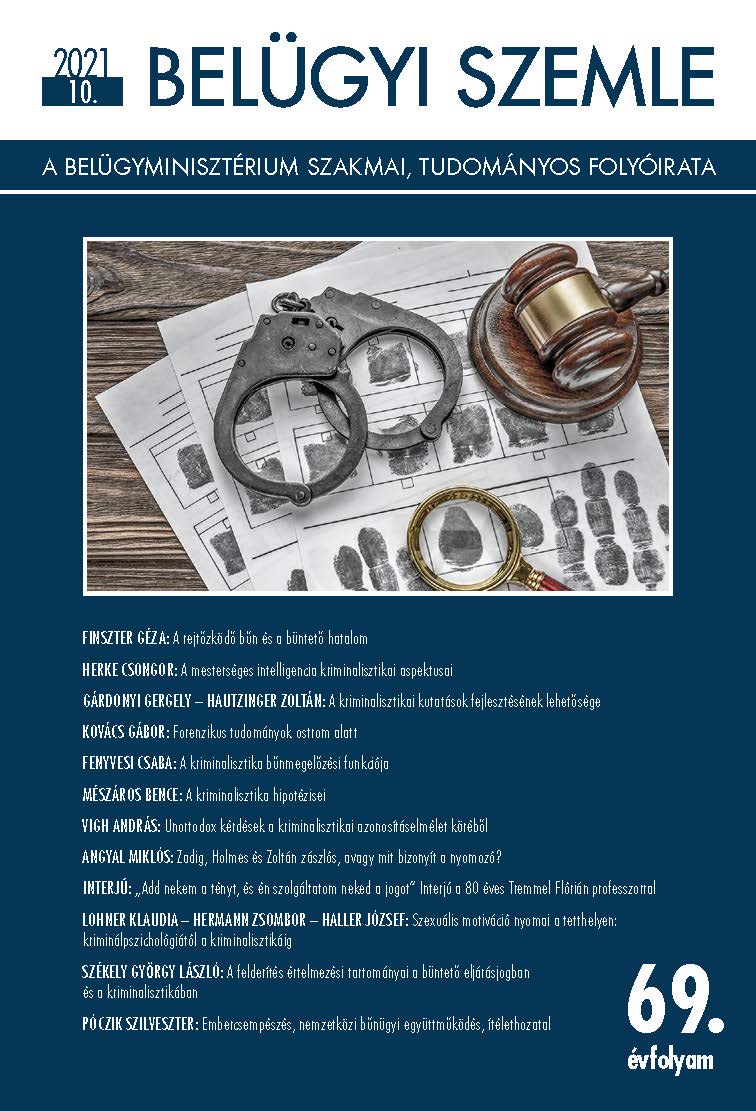Keywords
criminalistics
learning the past
criminal procedure
learning the past
criminal procedure
How to Cite
Hiding crime and punishing power. (2021). Academic Journal of Internal Affairs, 69(10), 1691-1707. https://doi.org/10.38146/BSZ.2021.10.1
Abstract
Learning the past will acquire a procedural significance when some real event of the past would trigger legal consequences. In addition to criminal cases this can be realized in civil litigation, in administrative procedures of the public power, but examples can also be taken from the field of labour law. As criminalistics represent the science of reconstructing a past event, an extension of it to all legal fields can be reasoned. However, such a turn does not have taken place, the discipline of investigation remained within the sphere of criminal sciences. The article examines the causes of that.
Downloads
Download data is not yet available.
Similar Articles
- Dávid Petrétei, The Future of the Criminalistics, the Criminalistics of the Future , Academic Journal of Internal Affairs: Vol. 62 No. 10 (2014)
- Zsanett Fantoly, The human rights, fundamental rights and constitutional rights aspects of law enforcement and criminal procedure , Academic Journal of Internal Affairs: Vol. 66 No. 3 (2018)
- Balázs Márton, The European Public Prosecutor’s Office as a Hungarian investigating authority? , Academic Journal of Internal Affairs: Vol. 71 No. 2 (2023)
- Beáta Halász, The specialities of juvenile criminal procedure , Academic Journal of Internal Affairs: Vol. 62 No. 12 (2014)
- Csaba Fenyvesi, Global trends in forensic science in the 21st century , Academic Journal of Internal Affairs: Vol. 61 No. 10 (2013)
- Barbara Katalin Herke-Fábos, Possibili in the light of Article 40 of the Convention on the Rights of the Child , Academic Journal of Internal Affairs: Vol. 69 No. 3 (2021)
- Gyula Sófi, Krisztina Törő , Gábor Csikós , Difficulties of forensic psychological and psychiatric expertise on sexual coercion against children in prosecution , Academic Journal of Internal Affairs: Vol. 71 No. 7 (2023)
- Csaba Fenyvesi, The second version of the criminalist pyramid-model , Academic Journal of Internal Affairs: Vol. 62 No. 9 (2014)
- Richárd Nagy, Vince Vári, New ways in asset recovery , Academic Journal of Internal Affairs: Vol. 69 No. 4 (2021)
- Sándor Fórizs, János Sallai: A trace of a bygone era. The History of the Iron Curtain , Academic Journal of Internal Affairs: Vol. 61 No. 5 (2013)
You may also start an advanced similarity search for this article.
Most read articles by the same author(s)
- Géza Finszter, Legal basis for the use of covert means , Academic Journal of Internal Affairs: Vol. 72 No. 6 (2024)
- Géza Finszter, Legal basis for the use of covert means , Academic Journal of Internal Affairs: Vol. 72 No. 6 (2024)
- Géza Finszter, Complementary policing , Academic Journal of Internal Affairs: Vol. 71 No. 1 (2023)
- Géza Finszter, The place and perspectives of administrative and law enforcement research , Academic Journal of Internal Affairs: Vol. 70 No. 11 (2022)
- Géza Finszter, Tibor Ibolya: Studies in the history of criminology , Academic Journal of Internal Affairs: Vol. 63 No. 10 (2015)
- Géza Finszter, Endre Bócz , Academic Journal of Internal Affairs: Vol. 69 No. 11 (2021)
- Géza Finszter, Tibor Király (1920–2021) , Academic Journal of Internal Affairs: Vol. 70 No. 2 (2022)
- Géza Finszter, László Korinek, Facts are stubborn things … The worse for the facts?! , Academic Journal of Internal Affairs: Vol. 69 No. 4 (2021)
- Géza Finszter, “Today, a mentally prepared team is being formed, which is the initiator and recipient of the scientific approach… " , Academic Journal of Internal Affairs: Vol. 63 No. 5 (2015)
- Géza Finszter, László Korinek, István Szikinger is 70 years old , Academic Journal of Internal Affairs: Vol. 70 No. 3 (2022)
